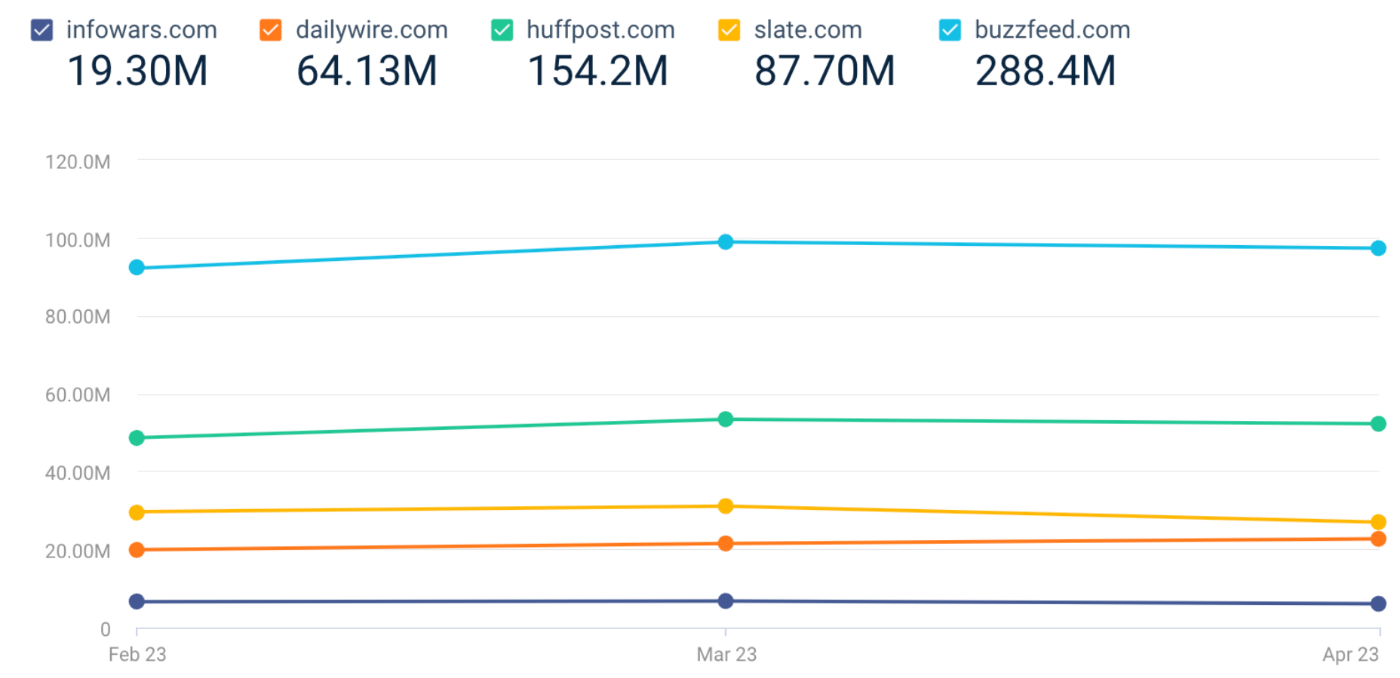
Sponsored By: Brave
Let's get real: the internet can feel creepy sometimes. That's where Brave Browser comes in – your new privacy pal.
There have been three great beneficiaries of the attention economy. First and second were Facebook and Google, both of which have built some of the most incredible businesses of all time. Weirdly, many other consumer brands playing in the same arena have struggled. Just in the past few months, Vice, Gawker, BuzzFeed, IRL, BeReal, and Clubhouse have all struggled to capture some of that sweet eyeball-associated revenue.
Even more interesting is the third group of beneficiaries: Right-wing publications have thrived.
The Daily Wire, Ben Shapiro’s Nashville-based outfit, has over 1M paying subscribers, and is estimated to have pulled in over $200M in revenue in 2022. Alex Jones, the conspiracy theorist who said that the elementary school shooting in Sandy Hook was a hoax, pulled in $165M over three years selling supplements. And there are many others! The Drudge Report is a one-man money-making machine. Rumble has emerged as a legitimate competitor to YouTube with real revenue/users. Depending on your bent, Twitter may even qualify as one of these companies now too.
What matters is that, from a business perspective, these businesses have succeeded while utilizing the same playbook. They had similar technology. They had similar tools. They even have somewhat similar traffic:
But they have had wildly different outcomes. Despite BuzzFeed (which also owns huffpost.com) having nearly 6x the traffic, Daily Wire makes 50% of BuzzFeed’s revenue. So what happened?
The title of this piece is tongue-in-cheek but it is also kind of real. Why have right-wing publications thrived? The left-leaning publications had Ivy League–educated employees and the best investors in the world, but they haven’t lived up to expectations.
This contrast is especially bizarre because both sides are children of the same media scene. Early 2000s New York was the birthplace of seemingly everyone in digital media. Andrew Breitbart was a co-founder of the Huffington Post. Steve Bannon hung around the BuzzFeed team. Vice co-founder Gavin McInnes helped start the Proud Boys. Chris Poole, the founder of 4chan, was a loose affiliate of the New York digital media scene, too. Ben Shapiro was Andrew Breitbart’s intern.
The answer matters not just for media participants but for everyone whose business has a digital component. At various levels of abstraction, every business on the planet is in the game of driving website traffic and converting that traffic into money. Understanding how Alex Jones has a better business than BuzzFeed matters.
The BuzzFeed bet
On August 11, 2014, Chris Dixon and a16z announced they were leading a $50M round into BuzzFeed at an $850M valuation. In a blog post on his personal website, which he has now deleted (lol), Dixon explained the thesis for the bet:
“Many of today’s great media companies were built on top of emerging technologies. Examples include Time Inc., which was built on color printing, CBS, which was built on radio, and Viacom, which was built on cable TV. We’re presently in the midst of a major technological shift in which, increasingly, news and entertainment are being distributed on social networks and consumed on mobile devices. We believe BuzzFeed will emerge from this period as a preeminent media company.”
Honestly, this feels reasonable. Chris, there was no need to delete the post! Venture capital is a game where 1/20 bets pays off. At the time when they deployed this capital, it really seemed like a smart risk/reward ratio. I talked with Ben Smith—the editor in chief at Semafor, the former EIC at BuzzFeed News, and the author of the new book Traffic—who described to me what it felt like in the years between 2012 and 2015. If you pay attention, you’ll notice the fundamental error they made in their assumptions:
“We had this core thesis that social media was swallowing media. We were going to be the big, big content media company built into the social media ecosystem. We were profitable. Our revenue was growing fast. Our cultural cache and brand were growing fast too.”
Didn’t catch it? Let me give you another hint from Dixon:
“We see BuzzFeed as a prime example of what we call a ‘full-stack startup.’ BuzzFeed is a media company in the same sense that Tesla is a car company, Uber is a taxi company, or Netflix is a streaming movie company. We believe we’re in the ‘deployment’ phase of the internet. The foundation has been laid. Tech is now spreading through every industry and every part of the world. The most interesting tech companies aren’t trying to sell software to other companies. They are trying to reshape industries from top to bottom.”
BuzzFeed was not a full-stack startup. It was not even a 30% startup. It was simultaneously outsourcing its most important competitive advantage (distribution) to the exact same company they were competing for revenue with (ad dollars).
The Only Subscription
You Need to
Stay at the
Edge of AI
The essential toolkit for those shaping the future
"This might be the best value you
can get from an AI subscription."
- Jay S.
Join 100,000+ leaders, builders, and innovators

Email address
Already have an account? Sign in
What is included in a subscription?
Daily insights from AI pioneers + early access to powerful AI tools











Comments
Don't have an account? Sign up!